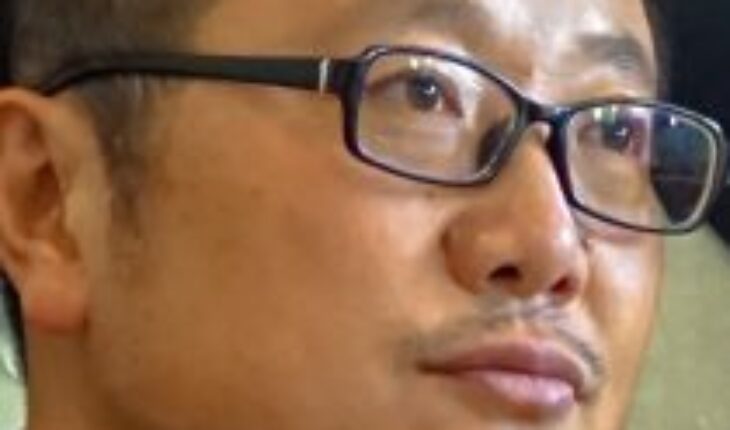Cixin Liu (Yangquan, 1963) is the flagship of the justly famous Chinese science fiction, known for the successful series of novels referring to “The Three Bodies”, whose first novel, “The Problem of the Three Bodies”, won the Hugo Prize in 2015 (the first novel translated into English to have won the award).
In his own country, the author has won the Galaxy Award eight times (the Chinese Hugo Award). The trilogy of the three bodies has sold millions of copies worldwide, thanks to the undeniable appeal of its stupendous narrative.
Before dedicating himself exclusively to his work as a writer, Cixin Liu worked as an engineer at a power plant in Shanxi Province. He was surprisingly calculating: he chose the engineering career to obtain job stability so that he could dedicate himself to his true passion: writing science fiction. Also because he wanted to be very close to scientific and technological findings to feed on them and use them in his future fictions.
In 2009 he achieved full fame with the publication of the successful novel, inaugurating the trilogy, “The problem of the three bodies”. This not only boosted his personal career as a writer, but catapulted an entire generation of Chinese authors of the genre, who have the merit of having revolutionized and updated it in a very vitalizing way.
“Hold the Sky” is a collection of eleven short stories by the author, all of them quite extensive, so much so that some approach a short novel. He states that the reading of Jules Verne’s “Journey to the Center of the Earth” was the cause of his fascination with science fiction.
Cixin Liu is a born seducer, who starts by wrapping the reader in his imaginative and literary webs, just as a spider does with its prey, wrapping it in a sticky silk from which there is no possible escape. It usually progresses slowly, with parsimony, providing all kinds of details to the reader. His characters are deep, complex, human. Reading it is a high-flying aesthetic experience.
The author benefited from the accelerated development of China’s productive and technological modernization, which corresponds to a scenario of great and fabulous changes that have led that country to an extraordinary and promising position as a world power. That same scenario determines that Cixin Liu’s vision is more global, where humanity tends to behave as a unitary and integrated system: a kind of upper plane that allows speculating on possible future destinies, very far in time.
In this way it is possible to ask the ancient and fundamental questions about the reason for our existence. Where are we going as humanity, beyond our incredible insignificance to the universal scale? And where are we going as a universe? Here the foundations of a new mentality are laid.
In the narrative of our author, the relationship between the universe (giant, infinite) and humanity (minimal, precarious, ephemeral) is repeatedly explored, precisely in the notion of the Big Bang. At the initial instant of the universe we go from nothing to the expanding whole. All matter was contained in the same point: all the atoms of which everything is made come from the same initial point. That is a powerful, undeniable, unifying bond.
Each story in this collection is a careful, meaningful work endowed with depth and significance. The plots are very well planned and the writing is delicate, precise, appropriate to the purpose. The characters have a very well-defined personal psychology, character and complexity. And there are always remarkable moments of intensity, typical of good literature. Build very detailed and tangible atmospheres. I turn to some of the narratives that make up the volume.
“The Village Master” is a totally rural narrative; It takes place in a secluded village, where a humble teacher of unlimited vocation for his students carries out his task without sparing efforts, while an illness devours him. Curiously, this pedagogical devotion ends up – in an unsuspected way – saving humanity from the devastating effects of a millenary war between two macro civilizations.
“Migration in Time” could be considered a classic account of time travel. A group of explorers repeatedly seeks in the future a refuge for the systematic destruction of the environment. It is a beautiful, bleak, philosophical, and hopeful story at the same time.Po, where we return to the beginning to find salvation, which is not precisely in technological development.
“April 1, 2018” addresses the search for eternal life, the defeat of the dreaded and incontrovertible death, a privilege for the ultra-rich.
“A Delusional Plot” conflicts incredible powers vying for access to the Juvencio fountain. The big question behind it is how eternity will affect human nature, in essence perishable.
“Espejo” is an extensive and remarkable narrative, where the corruptibility of the human being is addressed, regardless of the organizational systems of which he is endowed to try to defeat it. A quantum supercomputer is the stellar protagonist of this nouvelle, one capable of simulating in detail the evolution and behavior of an entire universe from its starting parameters. In this simulation – that is the mirror to which the title refers – everything that happened can be observed: detect any unfair act, destined to produce gains of power or wealth to any government dignitary, by can that is its category. Precisely one of the main characters lacks a specific name and only refers to him as the high dignitary. A fascinating plot that puts us in touch with human nature and its darkest and brightest aspects.
From the great china, its millenary culture, its vertiginous economic growth and amazing skills to combine capitalism and socialism, arises the work of Cixin Liu. Perhaps this century is of Chinese literature, as the twentieth century was , it is my belief – of American literature: multiple, challenging, critical, renewing, dynamic, surprising. A kind of correspondence between social and economic development and the crises of growth, amplified by the powers of reason and imagination.
“Sustaining the sky” is a recommended read for anyone interested in good science fiction, but especially in the best literature, one that reflects deeply on the keys of its time and humanity since its inception.
Sheet
“Sustaining the sky”, short stories, Ed. Nova, Penguin Random House Group, 2021, 387 pp.





